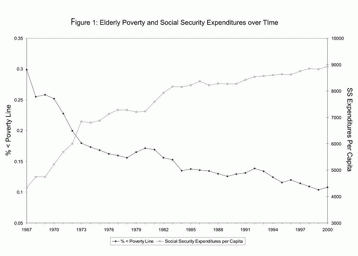Read the rest here: srdc.msstate.edu/socialsecurity/files/2011_11_socsecurityimpact.pdf
So, this means that there is a net GAIN for every dollar spent on Social Security and, though this is somewhat controversial, it may be as high as double the input.
Seen that way, we ought to fund SS unless the funding would cost us more than double the amount spent - say, with a 100% interest rate AND a government that did not have the right and ability to "coin Money" (Article 1, Section 8, clause 5 of the U.S. Constitution). Since the U.S. has essentially an unlimited ability to borrow money, and at rates close to zero - not 100%! - there really is no question that we ought to do that.
This is quite apart from the moral and societal impact of having millions of impoverished seniors that family members -- often in their prime earning years - and over-stressed private institutions, from churches to soup kitchens, would struggle to care for. We've been there and done that, before we had Social Security. It was mass poverty of seniors, well beyond the ability of the institutions of a hundred years ago, that caused FDR to create Social Security in the first place. The need for Social Security really ought to be beyond debate now. However, for those who still require proof, and who are not so blinded by theo-economic beliefs that nothing will convince them, the National Bureau of Economic Research says:
Elderly poverty in the U.S. decreased dramatically during the twentieth century. Between 1960 and 1995, the official poverty rate of those aged 65 and above fell from 35 percent to 10 percent, and research has documented similarly steep declines dating back to at least 1939. While poverty was once far more prevalent among the elderly than among other age groups, today's elderly have a poverty rate similar to that of working-age adults and much lower than that of children.
Social Security is often mentioned as a likely contributor to the decline in elderly poverty. Enacted in 1935, the Social Security system experienced rapid benefit growth in the post-WWII era. In fact, there is a striking association between the rise in Social Security expenditures per capita and the decline in elderly poverty, as Figure 1 illustrates (with both series scaled to fit on the same figure).

Social Security vs. Poverty Rate over time
(Image by National Bureau of Economic Research) Details DMCA
See the full report here: http://www.nber.org/bah/summer04/w10466.html
Social Security works. It does what it was designed to do, and although this was not the concern when it was set up, it actually boosts the national output above what it distributes. It is a win-win-win.
Of course, from an economic standpoint, a separate issue is whether a truly sovereign government ought to borrow its own currency at all. This gets into whether we want to support a growing (in wealth) class of idle rent-seekers, both at home and abroad. At home, the issue becomes whether these institutions that seek rent of our money to us, actually put more back into the economy than they take out. This is the banking sector and institutional bond buyers. Well, though some of these bond buyers are funds that do support pensioners, who, like Social Security recipients, spend more into the economy than they take out, there are more direct ways to do this, like Social Security.
(Note: You can view every article as one long page if you sign up as an Advocate Member, or higher).





